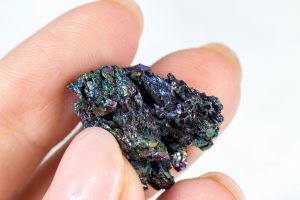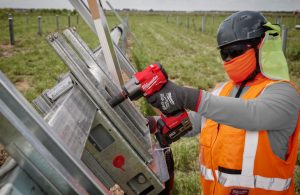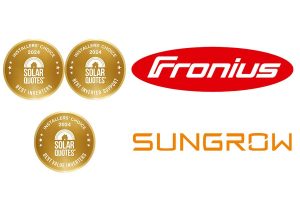Here’s what to know about the new B Corp standards

B Lab Global, the nonprofit behind the well-known “Certified B Corp” designation, is proposing revisions that require companies seeking the logo to meet specific performance requirements across environmental, social and governance policies.
That’s a departure from the current standard, which offers flexibility in the way companies are scored during the certification process — allowing them to be dominant in some areas, such as climate action, while earning lower marks in others, such as workers’ rights.
The change reflects the intensifying climate crisis and more rigorous regulatory landscape, especially in Europe where many companies are required to report on ESG matters, according to B Lab’s interim CEO.
“Markets are changing, businesses are changing, the environment in which we work is changing, and we need to change as well,” said B Lab Interim CEO Clay Brown, also head of standards, certification and product delivery.
Adding discipline for a growing movement
More than 8,000 companies are Certified B Corps, a label meant to recognize companies that prioritize people and planetary concerns alongside corporate profits. While most are small or midsize enterprises, bigger companies are joining, too. Multinational food makers Bonduelle and Danone, apparel designer Patagonia, and cosmetics company Natura & Co are all on that list. Other large companies, such as Unilever, are beginning the process. B Lab estimates 250,000 companies worldwide use the Certified B Corp framework to guide them, even if they haven’t achieved official certification.
With that growth comes a need for more specific thresholds and tiered expectations based on company size, Brown said. Under the current rules, companies need to earn 80 points for a “positive” rating over a wide menu of ESG practices. A company could score particularly well in one area, such as human rights policy, but not for something like emissions reductions. That flexible approach has limitations, B Lab notes in its draft proposal. One of those is an inability to demonstrate improvement on any one particular metric.
Under the proposed guidelines, companies will need minimum marks across defined “Impact Topics” including:
- A stated purpose of creating “an inclusive, equitable and regenerative” economic system
- Two-way communication with workers
- Fair wages
- Justice, diversity, equity and inclusion policies
- Human rights
- Climate action
- Circular business practices and environmental stewardship
- Collective action on ESG issues with other companies
- A commitment to continuous improvement on other material issues for their business
Companies will need to satisfy all those requirements before certification, according to B Lab, and then it would be scored on factors that vary depending on the company’s size and industry. “These criteria are contextual and increasingly more rigorous,” Brown said.
Here are other changes that B Lab is highlighting:
- Closer alignment with other ESG reporting standards, such as the Science Based Targets initiative, which adminstrates science-based targets for emissions reductions.
- A new rule for companies that offer professional services that would require them to assess the environmental and human rights impacts of working with certain clients
- A ban on certifying companies in the following industries: firearms; weapons; munitions; pornography; tobacco; recreational marijuana; and gambling. Companies that generate more than 5 percent of their revenue from servicing clients in fossil fuels industries are also ineligible.
That latter rule may already be a factor for ad agency holding company Havas, which may have its B Corp status stripped for taking on Shell’s media account last year.
“The B Corp logo is a signal to engaged consumers that the company they are purchasing from meets high, externally verified standards of ESG,” said Anita Spiller, vice president of environmental, social and governance matters for Canadian laundry detergent company Tru Earth, which earned its B Corp certification in April. “I see these changing regulations as an opportunity to boost trust among those consumers and help the pool of B Corps be more credible than ever.”
This is the seventh edition of the Certified B Corp standard, which is updated every three to five years. The current draft was developed in response to a consultation that reflects feedback from more than 1,000 stakeholders, according to B Lab.
The organization is seeking feedback about the proposed changes, which were published for public comment, until March 26. B Lab plans to publish the finalized update before the end of 2024, Brown said, and the new standard is likely to be phased in starting next year.






